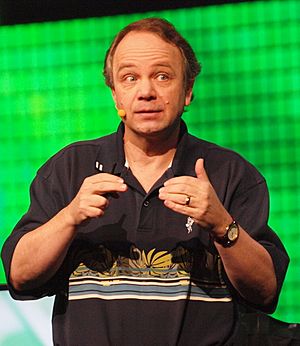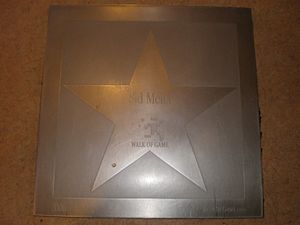Sid Meier facts for kids
Quick facts for kids
Sid Meier
|
|
|---|---|

Meier at the 2010 Game Developers Conference
|
|
| Born | February 24, 1954 |
| Education | University of Michigan (BA) |
| Occupation | Businessman, computer programmer |
| Years active | 1981–present |
| Employer | 2K Games |
| Known for | MicroProse, Firaxis Games, Civilization series |
| Spouse(s) | Susan Meier |
| Children | Ryan Meier |
| Awards | AIAS Hall of Fame Award (1999) |
Sidney K. Meier (/ˈmaɪər/ mire; born February 24, 1954) is a famous American businessman and computer programmer. He is well-known for designing and producing many popular strategy and simulation video games. One of his most famous creations is the Civilization series.
Sid Meier helped start a company called MicroProse in 1982 with Bill Stealey. Later, in 1996, he co-founded Firaxis Games with Jeff Briggs and Brian Reynolds. He is currently the Director of Creative Development at Firaxis Games. Because of his big impact on the video game industry, Sid Meier was honored in the Academy of Interactive Arts and Sciences Hall of Fame.
Contents
Early Life and Education
Sid Meier was born in Sarnia, Ontario, Canada. His family moved to Detroit, Michigan, when he was about three years old, and he grew up there.
He went to the University of Michigan. There, he studied history and computer science. He earned a Bachelor of Arts degree in computer science in 1975.
Career in Gaming
After college, Sid Meier worked on systems for cash registers in department stores. Around 1981, he bought an Atari 800 computer. This made him realize that he could use computer programming to create video games.
He met a co-worker, Bill Stealey, who also loved making games. They decided to start a new company together. This was a great time because the software and personal computer industries were growing very fast in the early 1980s.
Starting MicroProse
Sid Meier and Bill Stealey founded MicroProse in 1982. At first, they made some simple 2D action games. One of these was Meier's game Floyd of the Jungle.
Later, MicroProse started making many flight simulation games. These included Hellcat Ace (1982), Spitfire Ace (1982), Solo Flight (1983), and F-15 Strike Eagle (1985). Sid Meier designed and programmed all of these games.
Sid Meier's name first appeared on a game box in 1982 for Formula 1 Racing. By 1984, Bill Stealey began promoting Sid Meier as a star game creator. In 1987, the company released Sid Meier's Pirates!. This was the first game with "Sid Meier's" in its title.
Stealey explained that adding Meier's name helped sell games. He said a comedian, Robin Williams, suggested it. The idea worked very well. People started to trust games with Sid Meier's name on them.
Even though his name was on many games, Sid Meier was not always the main designer. For example, Brian Reynolds was the main designer for Sid Meier's Civilization II. Jeff Briggs designed Sid Meier's Civilization III.
After F-19 Stealth Fighter, Sid Meier focused on strategy games. He was inspired by games like SimCity. He then created Sid Meier's Railroad Tycoon and his most famous series, Sid Meier's Civilization. He designed the first Civilization game himself.
Around 1990, Bill Stealey wanted MicroProse to make arcade games. Sid Meier thought this was too risky. He sold his share of the company to Stealey but stayed in his role.
Creating Firaxis Games
MicroProse later joined with another company called Spectrum HoloByte in 1993. In 1996, Spectrum cut many jobs at MicroProse. Sid Meier, along with other MicroProse employees Jeff Briggs and Brian Reynolds, were not happy with these changes.
They decided to leave and form a new company called Firaxis Games in 1997. Firaxis continued to make the same types of strategy games. Many of these were new versions or follow-ups to Meier's earlier games. This included new Civilization games and a remake of Sid Meier's Pirates! in 2004.
In 1996, Sid Meier received a patent for a "System for Real-Time Music Composition and Synthesis." This was used in a program called C.P.U. Bach. Next Generation magazine listed him as one of the "75 Most Important People in the Games Industry of 1995."
Firaxis employees say that Sid Meier has been working on a special game engine since 1996. He uses it to test out new game ideas. He sometimes comes to the office with a new game prototype for the team to try.
In the early 2000s, Meier worked on a dinosaur-themed game. However, he announced in 2001 that the game was put on hold. He tried different ways to make it fun, but couldn't find the right one. He still likes the idea and hopes to work on it again someday.
His autobiography, Sid Meier's Memoir!: A Life in Computer Games, was published on September 8, 2020.
How Sid Meier Designs Games
Sid Meier often says that he focuses on the "fun parts" of a game. He removes anything that isn't fun. He believes finding that "fun" quality is the hardest part of designing a game.
Even though his games often involve battles or historical conflicts, they never show blood or gore. He designs his games by playing them over and over. He keeps playing until they are truly fun.
Personal Life
Sid Meier lives in Hunt Valley, Maryland, with his second wife, Susan. He is a Christian and attends Faith Evangelical Lutheran Church in Cockeysville. He is the Director of Contemporary Music there.
Susan Meier was one of the first 13 employees at Firaxis Games when it started. Sid Meier has a son named Ryan Meier. Ryan has worked for companies like Blizzard Entertainment, Firaxis Games, and Google.
Awards and Recognition
Sid Meier has received many awards for his work. In 1996, GameSpot named him the "Most Influential Person in Computer Gaming of All Time." They called him "our Hitchcock, our Spielberg, our Ellington" of games.
In 1999, he became the second person ever to be inducted into the Academy of Interactive Arts and Sciences' Hall of Fame. This is a very high honor in the video game industry.
He received a Lifetime Achievement Award at the 2008 Game Developer's Conference. In 2009, IGN ranked him second on their list of "Top Game Creators of All Time." They called him "the ideal role model for any aspiring game designer." In 2017, he won the Life Achievement award at the Golden Joystick Awards.
Games Created
Sid Meier has been involved in developing, co-developing, and producing many video games. Here are some of his notable works:
| Release Year | Game Title | Notes |
|---|---|---|
| 1982 | Hellcat Ace | One of Sid Meier's first projects for MicroProse. |
| 1982 | Chopper Rescue | An improved commercial version of an earlier game. |
| 1982 | Floyd of the Jungle | An early action game by Sid Meier. |
| 1983 | Solo Flight | A flight simulation game. |
| 1984 | F-15 Strike Eagle | A popular flight simulation game. |
| 1985 | Silent Service | A World War II submarine simulation game. |
| 1986 | Gunship | A helicopter combat simulation. |
| 1987 | Sid Meier's Pirates! | A pirate simulation game. This was the first game to include "Sid Meier's" in its title. |
| 1988 | Red Storm Rising | A nuclear submarine simulation game based on a novel. |
| 1988 | F-19 Stealth Fighter | A popular stealth fighter simulation. |
| 1990 | Sid Meier's Railroad Tycoon | A business simulation game about building railroads. |
| 1991 | Sid Meier's Civilization | A very successful turn-based strategy game. It started the famous Civilization series, which has sold over 73 million copies. |
| 1993 | Pirates! Gold | A remake of the 1987 Pirates! game with new features. |
| 1994 | Sid Meier's Colonization | A strategy game about early European colonization. |
| 1996 | Sid Meier's Civilization II | A follow-up to the original Civilization. |
| 1997 | Sid Meier's Gettysburg! | Sid Meier's first real-time tactical game. |
| 1999 | Sid Meier's Alpha Centauri | A Civilization-like game set on another planet. |
| 2001 | Sid Meier's Civilization III | The third main game in the Civilization series. |
| 2002 | Sid Meier's SimGolf | A golf simulation where players build and play their own golf courses. |
| 2004 | Sid Meier's Pirates! | An updated remake of the classic Pirates! game. |
| 2005 | Sid Meier's Civilization IV | The fourth main game in the Civilization series, with 3D graphics. |
| 2006 | Sid Meier's Railroads! | A sequel in the Railroad Tycoon series. |
| 2008 | Sid Meier's Civilization Revolution | A Civilization game made for game consoles. |
| 2008 | Sid Meier's Civilization IV: Colonization | A standalone remake of the 1994 Colonization game. |
| 2010 | Sid Meier's Civilization V | The fifth main game in the Civilization series. |
| 2013 | Sid Meier's Ace Patrol | A World War I flight strategy game. |
| 2014 | Sid Meier's Civilization: Beyond Earth | A game similar to Alpha Centauri, built on the Civilization V engine. |
| 2015 | Sid Meier's Starships | A strategy game set in space. |
| 2016 | Sid Meier's Civilization VI | The sixth main game in the Civilization series. |
| 2025 | Sid Meier's Civilization VII | The seventh main game in the Civilization series. |
See also
 In Spanish: Sid Meier para niños
In Spanish: Sid Meier para niños
 | Aurelia Browder |
 | Nannie Helen Burroughs |
 | Michelle Alexander |


